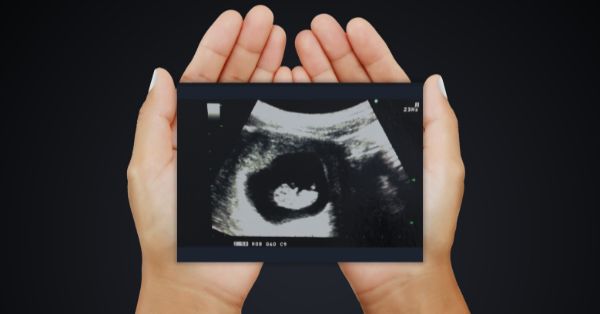Pregnancy is a time of new feelings and sensations but not all of them are pleasant. After all, pregnancy can be extremely hard on your body but is it normal to be cramping after ultrasound?

Is Cramping After Ultrasound Normal?
Having cramps after ultrasound is normal, and nothing big to worry about. Your uterus can get upset from all the pressure being placed on it during the scan, especially if you have an internal scan.
What Is An Ultrasound
Let’s start by saying that an ultrasound is a painless procedure where a sonographer uses sound waves to build a picture of your baby inside you. There are two types of ultrasound and which one is used will depend on how far along you are in your pregnancy.
- Abdominal Ultrasound
This will be the one you see in all the movies where they put a little gel on your belly and then place a handheld device called a transducer across the area to build a picture of your little one.
These are used from around 12 weeks of pregnancy when you will usually have your first scan called your dating scan.
- Transvaginal Ultrasound
This is a little more intrusive and can be extremely uncomfortable. The sonographer will insert a special ultrasound probe into your vag. It uses sound waves in the same way as an abdominal ultrasound does and creates an image of your uterine lining.
These are used during early pregnancy usually before 12 weeks if there are any concerns about the viability of the fetus.
Reasons For an Ultrasound During Pregnancy
Ultrasounds can be used for a variety of different reasons during pregnancy depending on what stage you are at.
First Trimester
The first trimester of pregnancy is weeks one to 12 and ultrasounds are done for the following reasons.
- Confirm pregnancy
- Check fetal heartbeat
- Estimate due date
- Check for multiple pregnancies
- Examine the placenta, and cervix
- Diagnose an ectopic pregnancy
- Looking for abnormal growth
Second and Third Trimesters
The second trimester is from weeks 12 to 24, while the third trimester is from 24 to 40 weeks and ultrasound may be done for the following reasons.
- To monitor the growth and position of your baby.
- Determine the baby’s sex
- Confirm multiple pregnancies
- Check for problems with the placenta
- Check for downs syndrome
- Assess birth defects and abnormalities
- Monitor the level of amniotic fluid
- Confirm an intrauterine death
- To determine if the baby is getting enough oxygen
- Diagnose pregnancy tumors or issues with the ovaries or uterus
- Measure the length of the cervix
- To guide tests such as amniocentesis

What Causes Cramping After An Ultrasound?
Hundreds of women have ultrasounds every day but can ultrasound cause cramping? Well, the quick answer is unfortunately yes an ultrasound can cause cramping.
As we already know an ultrasound uses sound waves emitted from a transducer to build up an image of your little bub. Now when the transducer rubs against the skin or when the sound waves cause a build-up of gas or fluid in your intestines, it can cause cramping. Ouch!
Depending on how far along in your pregnancy you are will depend on the type of ultrasound you have and this can also impact any side effects you may experience.
If you are having an abdominal ultrasound it is common for you to experience cramping but it is usually mild and should not impact your day to day activities.
Many women describe the cramping as more of a dull ache a bit like when you get a bruise or bump yourself and it should go away in a day or so.
However, if it does not go away, gets worse, or is accompanied by bleeding then you need to get in touch with your doctor immediately.
Can Internal Ultrasound Cause Cramping?
Having an internal ultrasound is a lot more intrusive than an abdominal one and can cause some side effects especially if you are pregnant.
So if you are wondering is cramping normal after internal ultrasound – then yes it is.
Your cervix becomes extra sensitive and tender during pregnancy thanks to those pesky hormones that are rampaging through your body. So it is not uncommon for you to have some cramping after ultrasound. You may even get some light spotting afterward. This is normal and usually gets better in a day or so.
What Can You Do To Ease The Pain?
Cramping after an ultrasound is more common than you would expect but that doesn’t mean that it is not uncomfortable. So here are a few tips to help you try to avoid cramping after an ultrasound.
- Hydration
Ensure that you drink plenty of fluids before and after your ultrasound. This will help you to flush out any trapped gas or fluids that have built up in your intestines.
- Avoid Caffeine
Caffeine can overstimulate the production of stomach acid, which in itself can cause cramping as well as stomach pains and diarrhea.
- No Large Meals Before Ultrasound
While it may be tempting to spoil yourself and have a lovely meal before your ultrasound this is not the best idea. This is because undigested food in the stomach can block the sound waves and make it really difficult for the technician to get a clear picture of your little one.
- Take Pain Medication
If you are experiencing cramps then you could take an over the counter painkiller that is safe during pregnancy. This may help to take the edge off the pain and let you get the rest that you need.
- Move Around
After spending up to an hour lying on your back during your scan you really need to get up and move around in order to get the blood flowing again. This will also help to get any trapped gas moving as well.
- Use A Heat Pack
You could also apply a heat pack to the area that is cramping as this can help to ease the pain and help relax you which in turn will help with the cramping.

Preparation For Ultrasound Scan
To be honest there isn’t really any special preparation to be done before your ultrasound scan. But if you are worried there are a few things that you can do in order to make the experience a little more comfortable.
Wear comfortable clothing – if you are having an abdominal scan then you will need to remove any clothing that may get in the way of the handheld transducer. So you are best to try and wear trousers and a top or a skirt and top so that they can easily be pulled up or pushed down out of the way.
Drink a lot of water – Some doctors do request that you drink 4-6 glasses of water before your test to ensure that your bladder is full. This allows the sonographer to get a better view of your baby during the ultrasound.
But do be aware that if you drink too much fluid then your bladder could be too full and you will be asked to empty it slightly and that is far more difficult than it sounds.
When Should You Be Concerned About Cramping?
You’ve had your ultrasound and all is well with your little bub but now you are experiencing cramping, so you are wondering if you should see a doctor.
Well, the good news is that in the vast majority of cases cramping is nothing to worry about and will go away on its own in a day or two. But there are some occasions when you should definitely seek medical advice.
If your cramping is severe and accompanied by other symptoms such as
- Fever
- Vomiting
- Blood in your urine
Then it is time to get in touch with your doctor and seek some advice.
Another thing to note is if the cramping doesn’t go away after a few days or gets worse this is also a time when you should seek professional advice from your doctor.
Wrapping Up
So we have taken a detailed look at ultrasounds and what you need to do to prepare for one. We have also discovered that cramping after ultrasound is actually quite common but that for the vast majority of people it is nothing to worry about.
Now although we have said that there is nothing to worry about, if you are at all concerned about cramping or if it comes with other symptoms then you really need to get in touch with your doctor for some medical advice.
More to Read: